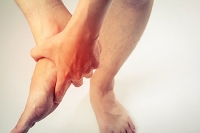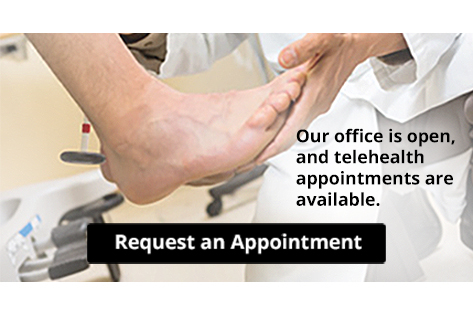
Blog (787)
What Does Foot Pain Indicate?
 Foot pain is considered to be a common ailment among many people. It can include pain in the toes, heel, and arch areas, which may be indicative of serious foot conditions. Toe pain can be a symptom of certain types of arthritis, bunions, or it may originate from an ingrown toenail. If there is pain in the ball of the foot, it may be linked to a condition that is referred to as Morton’s neuroma, which impacts the nerves of the foot. A common form of pain and discomfort in the heel can be connected to plantar fasciitis, heel spurs, or possibly from an Achilles tendon injury. If you are experiencing foot pain for any reason, it is strongly advised that you are under the care of a podiatrist.
Foot pain is considered to be a common ailment among many people. It can include pain in the toes, heel, and arch areas, which may be indicative of serious foot conditions. Toe pain can be a symptom of certain types of arthritis, bunions, or it may originate from an ingrown toenail. If there is pain in the ball of the foot, it may be linked to a condition that is referred to as Morton’s neuroma, which impacts the nerves of the foot. A common form of pain and discomfort in the heel can be connected to plantar fasciitis, heel spurs, or possibly from an Achilles tendon injury. If you are experiencing foot pain for any reason, it is strongly advised that you are under the care of a podiatrist.
Foot Pain
Foot pain can be extremely painful and debilitating. If you have a foot pain, consult with Dr. Kenneth Donovan from Advanced Care Foot and Ankle. Our doctor will assess your condition and provide you with quality foot and ankle treatment.
Causes
Foot pain is a very broad condition that could be caused by one or more ailments. The most common include:
- Bunions
- Hammertoes
- Plantar Fasciitis
- Bone Spurs
- Corns
- Tarsal Tunnel Syndrome
- Ingrown Toenails
- Arthritis (such as Gout, Rheumatoid, and Osteoarthritis)
- Flat Feet
- Injury (from stress fractures, broken toe, foot, ankle, Achilles tendon ruptures, and sprains)
- And more
Diagnosis
To figure out the cause of foot pain, podiatrists utilize several different methods. This can range from simple visual inspections and sensation tests to X-rays and MRI scans. Prior medical history, family medical history, and any recent physical traumatic events will all be taken into consideration for a proper diagnosis.
Treatment
Treatment depends upon the cause of the foot pain. Whether it is resting, staying off the foot, or having surgery; podiatrists have a number of treatment options available for foot pain.
If you have any questions, please feel free to contact one of our offices located in Warren, Livingston, and Toms River, NJ . We offer the newest diagnostic and treatment technologies for all your foot care needs.
Swollen Feet and Being Pregnant
It is a common observation among women who are pregnant to notice specific changes with their bodies, in addition to their growing fetus. Many of these changes involve the feet. Specific foot ailments may cause a general feeling of discomfort for pregnant women. A common foot condition is known as flat feet, which can happen as a result of the added weight the feet must support. As the arch gradually diminishes, the feet may become achy and feel tired for the majority of the day. Mild relief may be felt when shoes that are worn fit correctly. It may also help to wear insoles which may provide an arch. The toenails may be difficult to cut and maintain, and ingrown toenails may develop as a result of this. Additionally, swollen feet is a common side effect of pregnancy, and it is beneficial to elevate the feet as often as possible throughout the day. For additional information about how pregnancy can affect the feet, please consult with a podiatrist.
Pregnant women with swollen feet can be treated with a variety of different methods that are readily available. For more information about other cures for swollen feet during pregnancy, consult with Dr. Kenneth Donovan from Advanced Care Foot and Ankle. Our doctor will attend to all of your foot and ankle needs.
What Foot Problems Can Arise During Pregnancy?
One problem that can occur is overpronation, which occurs when the arch of the foot flattens and tends to roll inward.
This can cause pain and discomfort in your heels while you’re walking or even just standing up, trying to support your baby.
Another problem is edema, or swelling in the extremities. This often affects the feet during pregnancy but tends to occur in the later stages.
How Can I Keep My Feet Healthy During Pregnancy?
- Wearing orthotics can provide extra support for the feet and help distribute weight evenly
- Minimize the amount of time spent walking barefoot
- Wear shoes with good arch support
- Wear shoes that allow for good circulation to the feet
- Elevate feet if you experience swelling
- Massage your feet
- Get regular, light exercise, such as walking, to promote blood circulation to the feet
If you have any questions please feel free to contact one of our offices located in Warren, Livingston, and Toms River, NJ . We offer the newest diagnostic and treatment technologies for all your foot and ankle needs.
Swollen Feet and Being Pregnant
 It is a common observation among women who are pregnant to notice specific changes with their bodies, in addition to their growing fetus. Many of these changes involve the feet. Specific foot ailments may cause a general feeling of discomfort for pregnant women. A common foot condition is known as flat feet, which can happen as a result of the added weight the feet must support. As the arch gradually diminishes, the feet may become achy and feel tired for the majority of the day. Mild relief may be felt when shoes that are worn fit correctly. It may also help to wear insoles which may provide an arch. The toenails may be difficult to cut and maintain, and ingrown toenails may develop as a result of this. Additionally, swollen feet is a common side effect of pregnancy, and it is beneficial to elevate the feet as often as possible throughout the day. For additional information about how pregnancy can affect the feet, please consult with a podiatrist.
It is a common observation among women who are pregnant to notice specific changes with their bodies, in addition to their growing fetus. Many of these changes involve the feet. Specific foot ailments may cause a general feeling of discomfort for pregnant women. A common foot condition is known as flat feet, which can happen as a result of the added weight the feet must support. As the arch gradually diminishes, the feet may become achy and feel tired for the majority of the day. Mild relief may be felt when shoes that are worn fit correctly. It may also help to wear insoles which may provide an arch. The toenails may be difficult to cut and maintain, and ingrown toenails may develop as a result of this. Additionally, swollen feet is a common side effect of pregnancy, and it is beneficial to elevate the feet as often as possible throughout the day. For additional information about how pregnancy can affect the feet, please consult with a podiatrist.
Pregnant women with swollen feet can be treated with a variety of different methods that are readily available. For more information about other cures for swollen feet during pregnancy, consult with Dr. Kenneth Donovan from Advanced Care Foot and Ankle. Our doctor will attend to all of your foot and ankle needs.
What Foot Problems Can Arise During Pregnancy?
One problem that can occur is overpronation, which occurs when the arch of the foot flattens and tends to roll inward. This can cause pain and discomfort in your heels while you’re walking or even just standing up, trying to support your baby.
Another problem is edema, or swelling in the extremities. This often affects the feet during pregnancy but tends to occur in the later stages.
How Can I Keep My Feet Healthy During Pregnancy?
- Wearing orthotics can provide extra support for the feet and help distribute weight evenly
- Minimize the amount of time spent walking barefoot
- Wear shoes with good arch support
- Wear shoes that allow for good circulation to the feet
- Elevate feet if you experience swelling
- Massage your feet
- Get regular, light exercise, such as walking, to promote blood circulation to the feet
If you have any questions please feel free to contact one of our offices located in Warren, Livingston, and Toms River, NJ . We offer the newest diagnostic and treatment technologies for all your foot and ankle needs.
Care In The Comfort Of Your Home With Telehealth
Care In The Comfort Of Your Home With Telehealth
How Often Should Shoes Be Replaced
Research has indicated that when the correct shoes are worn, the overall body can be positively affected. There are several factors to look for when purchasing shoes. These can include ensuring the heels have a comfortable back, and that there is adequate room for the toes to move freely in. Additionally, it is beneficial if the shoe has ample arch support. Many shoes need to be replaced after a specific distance is reached, which is often between 350-500 miles. Many patients may choose to purchase new running shoes after one year, while keeping other shoes for walking. If you would like additional information about proper shoe duration, and how to look for shoes that fit properly, please consult with a podiatrist.
It is important to find shoes that fit you properly in order to avoid a variety of different foot problems. For more information about treatment, contact Dr. Kenneth Donovan from Advanced Care Foot and Ankle. Our doctor will treat your foot and ankle needs.
Proper Shoe Fitting
Shoes have many different functions. They cushion our body weight, protect our feet, and allow us to safely play sports. You should always make sure that the shoes you wear fit you properly in order to avoid injuries and deformities such as: bunions, corns, calluses, hammertoes, plantar fasciitis, stress fractures, and more. It is important to note that although a certain pair of shoes might be a great fit for someone else, that doesn’t mean they will be a great fit for you. This is why you should always try on shoes before buying them to make sure they are worth the investment. Typically, shoes need to be replaced ever six months to one year of regular use.
Tips for Proper Shoe Fitting
- Select a shoe that is shaped like your foot
- Don’t buy shoes that fit too tight, expecting them to stretch to fit
- Make sure there is enough space (3/8” to ½”) for your longest toe at the end of each shoe when you are standing up
- Walk in the shoes to make sure they fit and feel right
- Don’t select shoes by the size marked inside the shoe, but by how the shoe fits your foot
The shoes you buy should always feel as good as they look. Shoes that fit properly will last longer, feel better, and improve your way of life each day.
If you have any questions, please feel free to contact one of our offices located in Warren, Livingston, and Toms River, NJ . We offer the newest diagnostic and treatment technologies for all your foot care needs.
Requirements for Choosing to Practice Podiatry
The definition of a podiatrist is a doctor who treats conditions of the feet and ankles. They can advise patients on how to properly care for their feet, in addition to treating existing foot conditions that can be a result of diabetes or arthritis. After obtaining a bachelor's degree, and having completed a four-year program at a podiatric medical school, they are officially known as Doctors of Podiatric Medicine, and typically use the initials DPM after their names. It is beneficial for these types of doctors to be available at a variety of times, in addition to having good communication skills. People who may be interested in pursuing a career in podiatry are urged to consult with a podiatrist who can help to determine if this is the correct career choice for them.
If you are dealing with pain in your feet and ankles, you may want to seek help from a podiatrist. Feel free to contact Dr. Kenneth Donovan from Advanced Care Foot and Ankle. Our doctor can provide the care you need to keep you pain-free and on your feet.
What Is a Podiatrist?
A podiatrist is a doctor of podiatric medicine who diagnoses and treats conditions of the foot, ankle, and related structures of the leg. Your podiatrist may specialize in a certain field such as sports medicine, wound care, pediatrics, and diabetic care. Podiatrists have the ability to become board certified through training, clinical experience, and then taking an exam.
What Do Podiatrists Do?
On a daily basis, a podiatrist may perform the following activities:
- Diagnose foot ailments such as ulcers, tumors, fractures, etc.
- Use innovative methods to treat conditions
- Use corrective orthotics, casts, and strappings to correct deformities
- Correct walking patterns and balance
- Provide individual consultations to patients
It is very important that you take care of your feet. It’s easy to take having healthy feet for granted, however foot problems tend to be among the most common health conditions. Podiatrists can help diagnose and treat a variety of feet related conditions, so it is crucial that you visit one if you need assistance.
If you have any questions please feel free to contact one of our offices located in Warren, Livingston, and Toms River, NJ . We offer the newest diagnostic and treatment technologies for all your foot and ankle needs.
Requirements for Choosing to Practice Podiatry
 The definition of a podiatrist is a doctor who treats conditions of the feet and ankles. They can advise patients on how to properly care for their feet, in addition to treating existing foot conditions that can be a result of diabetes or arthritis. After obtaining a bachelor's degree, and having completed a four-year program at a podiatric medical school, they are officially known as Doctors of Podiatric Medicine, and typically use the initials DPM after their names. It is beneficial for these types of doctors to be available at a variety of times, in addition to having good communication skills. People who may be interested in pursuing a career in podiatry are urged to consult with a podiatrist who can help to determine if this is the correct career choice for them.
The definition of a podiatrist is a doctor who treats conditions of the feet and ankles. They can advise patients on how to properly care for their feet, in addition to treating existing foot conditions that can be a result of diabetes or arthritis. After obtaining a bachelor's degree, and having completed a four-year program at a podiatric medical school, they are officially known as Doctors of Podiatric Medicine, and typically use the initials DPM after their names. It is beneficial for these types of doctors to be available at a variety of times, in addition to having good communication skills. People who may be interested in pursuing a career in podiatry are urged to consult with a podiatrist who can help to determine if this is the correct career choice for them.
If you are dealing with pain in your feet and ankles, you may want to seek help from a podiatrist. Feel free to contact Dr. Kenneth Donovan from Advanced Care Foot and Ankle. Our doctor can provide the care you need to keep you pain-free and on your feet.
What Is a Podiatrist?
A podiatrist is a doctor of podiatric medicine who diagnoses and treats conditions of the foot, ankle, and related structures of the leg. Your podiatrist may specialize in a certain field such as sports medicine, wound care, pediatrics, and diabetic care. Podiatrists have the ability to become board certified through training, clinical experience, and then taking an exam.
What Do Podiatrists Do?
On a daily basis, a podiatrist may perform the following activities:
- Diagnose foot ailments such as ulcers, tumors, fractures, etc.
- Use innovative methods to treat conditions
- Use corrective orthotics, casts, and strappings to correct deformities
- Correct walking patterns and balance
- Provide individual consultations to patients
It is very important that you take care of your feet. It’s easy to take having healthy feet for granted, however foot problems tend to be among the most common health conditions. Podiatrists can help diagnose and treat a variety of feet related conditions, so it is crucial that you visit one if you need assistance.
If you have any questions please feel free to contact one of our offices located in Warren, Livingston, and Toms River, NJ . We offer the newest diagnostic and treatment technologies for all your foot and ankle needs.
Signs You May Have Developed Sesamoiditis
Sesamoiditis may occur when the sesamoid bones in the feet become inflamed. This condition can be incredibly uncomfortable and can cause pain that is typically felt in the ball of the foot. This condition is common among dancers, joggers, those who frequently wear high heels, as well as those who have high-arched feet. Along with feeling pain towards the forefront of the affected foot, you may also notice swelling and redness around the affected area. Custom orthotics can be worn as a means to alleviate pain and reduce pressure. For a proper diagnosis and treatment options, it is suggested that you contact a podiatrist if you feel that you are afflicted with sesamoiditis.
Sesamoiditis is an unpleasant foot condition characterized by pain in the balls of the feet. If you think you’re struggling with sesamoiditis, contact Dr. Kenneth Donovan of Advanced Care Foot and Ankle. Our doctor will treat your condition thoroughly and effectively.
Sesamoiditis
Sesamoiditis is a condition of the foot that affects the ball of the foot. It is more common in younger people than it is in older people. It can also occur with people who have begun a new exercise program, since their bodies are adjusting to the new physical regimen. Pain may also be caused by the inflammation of tendons surrounding the bones. It is important to seek treatment in its early stages because if you ignore the pain, this condition can lead to more serious problems such as severe irritation and bone fractures.
Causes of Sesamoiditis
- Sudden increase in activity
- Increase in physically strenuous movement without a proper warm up or build up
- Foot structure: those who have smaller, bonier feet or those with a high arch may be more susceptible
Treatment for sesamoiditis is non-invasive and simple. Doctors may recommend a strict rest period where the patient forgoes most physical activity. This will help give the patient time to heal their feet through limited activity. For serious cases, it is best to speak with your doctor to determine a treatment option that will help your specific needs.
If you have any questions please feel free to contact one of our offices located in Warren, Livingston, and Toms River, NJ . We offer the newest diagnostic and treatment technologies for all your foot and ankle needs.











